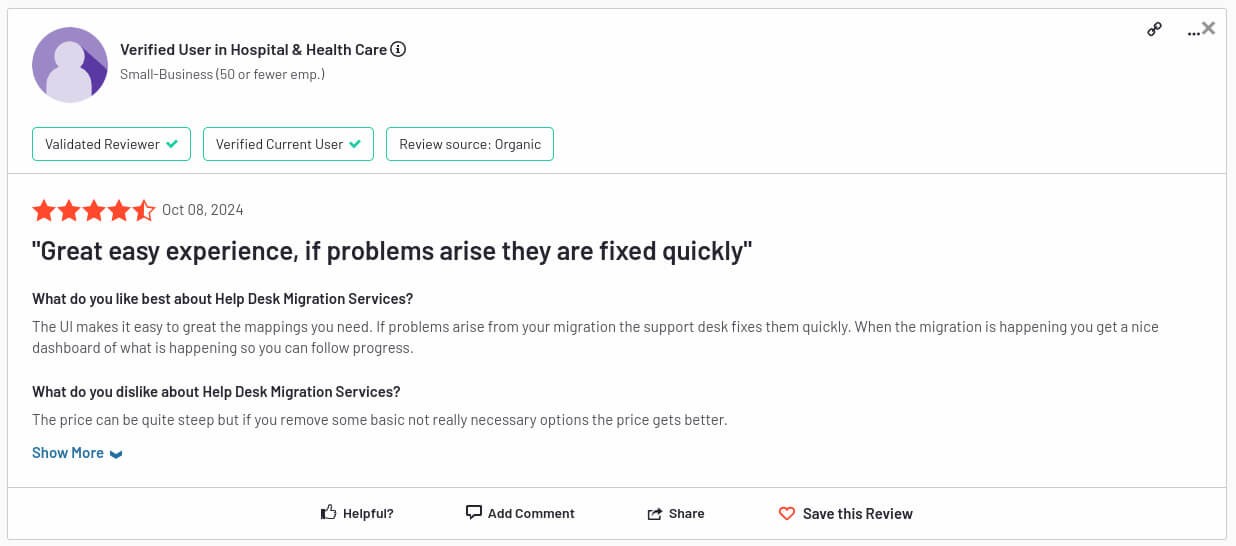Fact: Customer service matters because it keeps your customers coming back, builds trust in your brand, and turns good experiences into lasting relationships—and revenue.
When you want to get your product noticed, it can be tempting to focus solely on marketing campaigns. But what happens once people actually discover your creation? Your work has just begun, since it’s imperative that your customers then have a smooth experience using it, ideally on a regular basis.
While marketing might bring customers to your door, it's often the quality of your service that determines whether they'll stay, how often they'll return, and what they say about your brand to others.
So, let’s explore why customer service is important and how to transform your company's relationship with its customers.
Three benefits of customer service
Think back to the last time you had an excellent experience with a company. Maybe you had a friendly conversation with a support rep, a hassle-free refund, or just felt like they appreciated you as a customer. After this experience, you were probably more likely to shop with them again.
That’s one more loyal customer for the company and a big win in terms of profitability, especially in markets where other businesses offer pretty much the same products and services.
Yes, pleasant interactions drive loyalty. And that’s not the only benefit of great customer service. Let’s discuss some others below.
1 Building a brand image
People often head to review platforms first to ensure a company and their product are trustworthy. Just scrolling through a few reviews can influence a buyer's choice to either go with your brand or check out competitors.
Take a look at this real software review on G2:

Even though the reviewer doesn't point out any specific issues with the software itself, they still mention customer service. So, others might think, "If I purchase this product and something goes wrong, will I be stuck waiting ages for help?" This can make them consider alternatives, purposefully searching for proof that the customer service for competing products is easier to reach. Thus, you may have a user-friendly product at a compelling price, but people may still switch to rivals due to subpar assistance.
2 Facilitating upselling and cross-selling
When you consistently demonstrate your commitment to user satisfaction, customers can start seeing you not just as a seller looking for quick profits but as a go-to adviser.
When you recommend complementary goods or a software upgrade with better features, they will be less likely to think, “Ugh, here comes another sales pitch.” They’ll actually pay attention, thinking that if you believe this will help them, it must be a good fit.
3 Justifying premium pricing
Not only can you increase your average order value, but you can also enter the top-tier segment by offering more than just a product. If you sell products, you can only compete on its market-reasonable price. But if you sell amazing experiences, you can set a higher price for the entire package of both high-quality solutions and support, and it will be justified.
More than half of Shep Hyken’s respondents said customer service matters to them more than price. So, people don’t mind paying a little extra for comfort and peace of mind. This is especially important for complex products where ongoing support is usually a must.
Customers aren't the only ones who gain from great service; employees do, too. That's a win-win when it comes to keeping everyone happy!
Here’s why customer service is important for employees
Some companies are so eager for their workers to be passionate about their jobs that they have tried an unusual method: offering money (thousands of dollars!) to employees to quit so only the dedicated ones remain. Amazon got this idea from Zappos and had been doing it for years.
But there’s a more practical way to ensure your staff is engaged: by caring for your clients, you’ll end up caring for your employees. And that’s another reason why the importance of good customer service is huge.
In a workplace where customer service is a priority, agents start their shift knowing they'll likely communicate with grateful clients, solve meaningful problems, and actually make a difference. Contrast this with an environment where negativity is the norm. Even the most resilient reps can get burned out due to constant drama and complaints.
What’s more, a company known for exceptional service can better attract top talent. People will want to join this organization because they know they'll be part of a place clients respect, so they can proudly say, “Yes, I work there.”
Ultimately, good customer service creates a positive cycle. Employees’ enthusiasm and productivity translate into better experiences for users. In turn, satisfied customers make agents even more motivated.
The Ritz-Carlton Hotel and Joshie the Giraffe
A heartwarming story from the Ritz-Carlton hotel in Amelia Island, Florida, perfectly illustrates the impact of high employee morale on clients and the business. In 2012, a family forgot their son's beloved giraffe toy, Joshie, at the hotel.
But the staff didn’t just return the toy. They took photos of the giraffe enjoying hotel amenities and created an album of Joshie’s prolonged vacation before sending him home.

Everyone was happy — the family, Joshie, and the hotel staff having fun giving Joshie spa treatments. Plus, the business benefited, too. This story is buzzworthy even after 12 years, while Ritz-Carlton is still remembered as a hotel chain with that creative spark.
Could this situation have happened if hotel employees had to deal with rigid rules rooted in the company's focus on short-term profit only? Probably not, unless it was somehow part of their duties to "hand back lost toys with some flair."
Though the Ritz-Carlton's response was remarkable, such scenarios are rather occasional. So, we've prepared a list of surefire methods you can use daily to demonstrate you care about your customers.
Improve your customer service with these tips
Your service quality shouldn’t only be evaluated based on how you react to extraordinary circumstances. It’s about smart habits shaped by your company’s culture, as well as a well-thought-out process (yet flexible enough to stay creative). Now that you know why customer service is so important to your business let's see how you can improve it.
| Customer service tip | Details and samples |
|
Stay Proactive |
Anticipate customer needs with actions like personalized recommendations, reorder notifications, cart reminders, FAQs, feedback requests, and alerts for potential issues. Example: Delta Airlines' advisory page during the 2024 IT outages. |
|
See the Person Behind Each Request |
Use customer profiles with interaction history and preferences. Combine AI tools like Zendesk for 24/7 responses with human touch to keep interactions meaningful. |
|
Integrate Self-Service |
Offer solutions like customer portals, AI chatbots, and community forums. Example: Bank of America’s chatbot, Erica, and Adobe’s forum. Always ensure human agents are available for complex issues. |
|
Encourage Feedback |
Collect feedback through in-app surveys, email forms, and anonymous employee surveys. Act on suggestions to build trust and engagement. Example: 71% of customers feel feedback is ignored, but acting on it fosters loyalty. |
|
Invest in Employee Training |
Focus on onboarding, soft skills, scenario-based training, and tool proficiency to empower employees and improve customer interactions. |
|
Adopt an Omnichannel Help Desk |
Automate tasks with help desks offering features like voice support, AI tools, multilingual knowledge bases, and analytics. Omnichannel capabilities ensure seamless support across platforms. |
Stay proactive
Proactivity is about knowing what your customers need before they realize it. You don’t have to be a mind reader, but with the right techniques, it might seem you are.
Proactive service can take many forms:
- Offering personalized recommendations based on purchase history
- Notifying regular clients about reorder times
- Reminders about pending items in shopping carts
- Providing FAQ sections to address common challenges
- Asking for feedback instead of waiting for complaints
- Sending a heads-up about an upcoming product issue
And even if something unexpected does happen, you can still share general guidelines regarding the next steps. That’s what some airlines did during the CrowdStrike-related IT outages in July 2024, when thousands of flights were canceled. Delta created an advisory page with possible solutions so travelers would feel less frustrated about flight cancelations. Plus, this certainly lightened the load of their staff.
See the person behind each request
Gone are the days when a recipient’s name was enough to impress. Now, you can rely on detailed customer profiles with interaction history, behavioral data, and even preferred communication channels to offer personalized help. You just need robust software to centralize, segment, and analyze this data.
You can go further with AI-based tools, like Zendesk, that can generate custom replies 24/7. But here's the kicker: as tech gets smarter, the challenge is keeping things human. The winners are those who take advantage of AI while making every interaction natural and meaningful.
Integrate self-service
Customers often prefer finding answers on their own instead of staying on hold just to change their password or cancel a subscription. According to the 2024 State of Customer Service and CX Study, 26% of people have left a brand due to the absence of self-service options. And that’s not surprising since even brick-and-mortar stores are bringing in self-checkout kiosks and mobile apps for shopping in-store.
Here are some common self-service solutions:
- Customer portals let customers view purchase history, track orders, and update personal information without contacting agents.
- AI chatbots can help with troubleshooting, suggest products, and even handle returns. Bank of America’s chatbot Erica can understand clients’ intent, respond to their queries, update on monthly spending, and much more.
- Community forums provide a space where users can ask questions and share tips. Adobe's forum has 39,300 members at the time of writing and covers the entire software suite.
Yet, self-service isn’t meant to replace humans completely. There should always be a live agent available to assist when chatbots and forums can’t deliver a solution.
Encourage feedback
Bright ideas shouldn’t just come from the top but also from every level of the organization and outside of it. Employees who directly deal with customers and customers who actually use your product can bring a whole new perspective. All it takes is to implement feedback mechanisms.
For customers, you could set up in-app surveys that pop up after specific actions or send out email feedback forms with some kind of reward for filling them out. When it comes to employees, conduct anonymous surveys for truly honest input.
In a report on satisfaction surveys, Shep Hyken found that 71% of respondents assume their suggestions fall on deaf ears. So remember to actually act on feedback to prove this stat is just a stereotype and make respondents feel their efforts are appreciated.
Invest in employee training
Also, remember to prioritize thorough, continuous training for your agents since they’re the face and voice of your brand.
Comprehensive onboarding is crucial so newcomers can get acquainted with your products and the people they’ll serve. Soft skill workshops are good for developing empathy and improving active listening. Scenario-based training should also be considered so reps can confidently make their own decisions in different situations. Not only does this free up your time from constant oversight, but it also helps employees feel a sense of responsibility.
And don’t overlook software training programs. Whether your organization relies on a CRM system, a ticketing platform, or other tools, reps should know how to use these tools effectively so they don't get distracted from core activities.
Adopt an omnichannel help desk that meets your needs
Speaking of customer service tools, we can’t but mention automation, as it’s the backbone of all customer service processes. Why should your staff spend hours on manual work when data entry, segmentation, refund processing, and feedback collection can be completed with just a few clicks? Automation is an opportunity to decrease the cost per ticket and steer human effort in the right direction.
The market is rich with different customer service solutions, so you’re sure to find one that matches your workflows. For instance, help desks are centralized hubs where your team can effortlessly manage and resolve inquiries. Advanced options come with an array of features, such as:
- Voice support and AI summarizers
- Multilingual knowledge bases
- SLA management
- Employee productivity tracking
- Analytics and reporting
While you may not need all these features, pay attention to omnichannel capabilities so you can answer a query on social media, continue it via email, and finalize it through a phone call, and the customer can enjoy consistent service. Essentially, your help desk can be the only instrument you need to successfully follow all the tips above.
Final words
So, why is customer service important? Products can serve similar needs, and prices quickly match, but the experience you provide is what sets you apart. Excellent service demonstrates that customers are more than just transactions to your company, and that’s what will keep them coming back for more. Nurture interactions, invest in employee training, automate routine tasks, and eventually, you’ll achieve your benchmarks!



